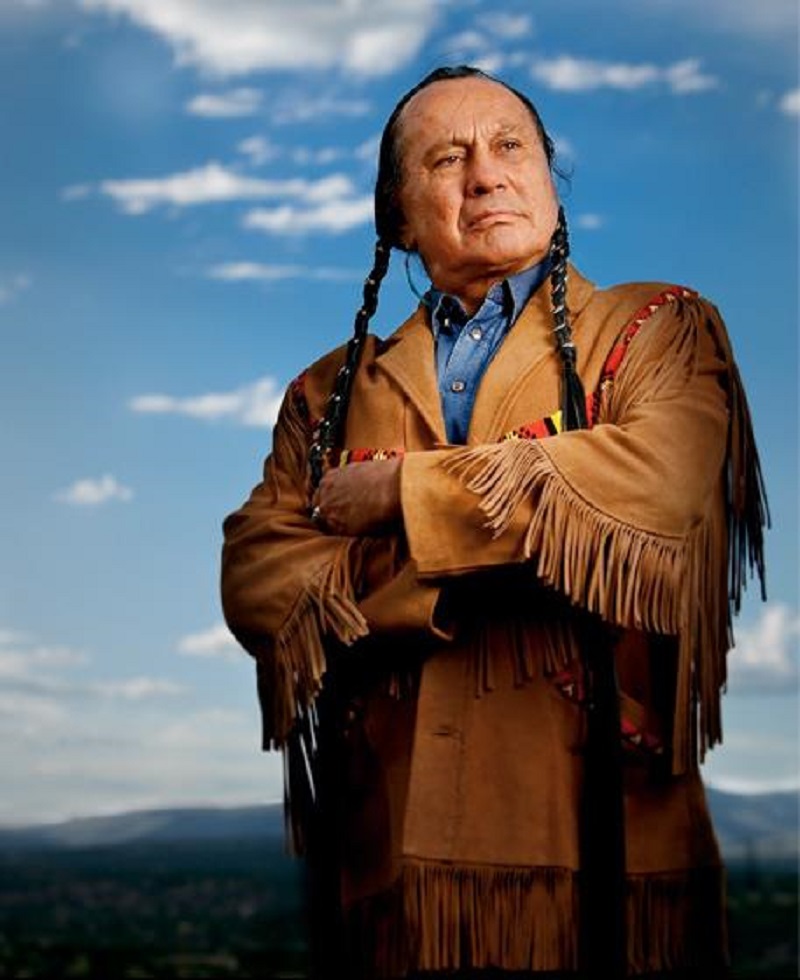
Russell Means was a prominent Civil Rights activist, American Indian Movement (AIM) leader, actor, and political figure. Born on the Pine Ridge Indian Reservation in South Dakota in 1939, Means lived a life of passion and purpose, advocating for the rights and welfare of Native American people. He played a significant role in the Red Power movement, which sought to reclaim tribal sovereignty and self-determination, and helped bring national attention to issues such as police brutality and broken treaties. In this article, we will take a deeper look into the life of Russell Means, exploring his childhood, activism, acting career, political campaigns and controversies, legacy, and personal life.
1. Early Life and Childhood of Russell Means
Introduction to Russell Means
Russell Means was a proud Oglala Lakota Sioux Indian, born in 1939 in the Pine Ridge Indian Reservation in South Dakota. He was a prominent figure in Native American activism and a strong advocate for their rights. Apart from being an activist, he was an actor, writer, and musician.
Family Background and Early Life
Russell Means was born to his parents, Harold and Theodora Means. His mother was a Yankton Sioux and his father was an Oglala Lakota Sioux. Russell Means grew up in a traditional Sioux family, and he learned the customs and traditions of his ancestors from his grandparents.
The Pine Ridge Reservation was a difficult place to live during Russell's childhood. Native Americans were living in extreme poverty, and they faced discrimination from those outside of their community. These hardships would shape his worldview and drive his activism in later years.
Education and Influences
Russell received his primary education at a Bureau of Indian Affairs boarding school, where he was taught to assimilate into mainstream American culture. He went on to attend boarding school in California, where he was introduced to the ideas of civil rights and activism. These experiences would shape his future activism and his desire to fight for the rights of Native Americans.
2. Becoming a Civil Rights Activist
Early Activism and Formation of the Crusade for Justice
In the 1960s, Russell Means became involved in the civil rights movement. He moved to Denver, Colorado, and organized a group called the Crusade for Justice. The goal of this group was to promote the rights of all oppressed people, including Native Americans.
Joining the American Indian Movement (AIM)
In 1970, Means joined the American Indian Movement (AIM), a group that was committed to fighting for the rights of Native Americans. Within AIM, Means would become a prominent figure and an influential voice in the movement.
3. Involvement in the American Indian Movement (AIM)
AIM's Goals and Mission
AIM was founded in 1968 in Minneapolis, Minnesota, with the goal of promoting the rights and interests of Native Americans. The organization was committed to fighting against the social and political inequalities that Native Americans faced, such as poverty, discrimination, and a lack of access to education and healthcare.
Means' Role in AIM and Major Protests
Russell Means quickly became one of the most visible and vocal members of AIM. He was involved in numerous protests and demonstrations, including the occupation of the Bureau of Indian Affairs building in Washington, D.C. in 1972.
One of the most significant protests that Means was involved in was the Wounded Knee Occupation in 1973. The protest was a response to the corrupt and oppressive tribal government on the Pine Ridge Reservation. AIM and its supporters occupied the town of Wounded Knee, which was the site of a massacre of Native Americans by the U.S. army in 1890. The occupation lasted for 71 days and resulted in the federal government negotiating with AIM and addressing some of their concerns.
Conflicts and Controversies within AIM
While Means and others within AIM were successful in promoting Native American rights, the organization was not without its controversies. Means was accused by some within the movement of being too focused on publicity and not committed enough to the cause. Additionally, there were allegations of violence and corruption within the organization, which led to tension and conflict between members.
4. Acting Career and Cultural Contributions
Transition to Acting and Notable Roles
Russell Means began his acting career in the 1990s, and he quickly became a recognizable figure in American film and television. He is best known for his roles in the films "The Last of the Mohicans" and "Natural Born Killers." Means was also a talented writer and wrote several books, including his autobiography "Where White Men Fear to Tread."
Preserving Native American Culture and Heritage
Throughout his life, Russell Means was committed to preserving Native American culture and heritage. He believed that it was essential to keep traditional customs and beliefs alive, and he worked tirelessly to promote cultural awareness and pride. Means was also committed to promoting sustainable living and protecting the environment, which he saw as an essential aspect of Native American culture.
5. Political Campaigns and Controversies
Run for Political Office and Advocacy for Sovereignty
Russell Means was a political activist and advocate for Native American sovereignty starting early in his career. In 1987, he ran for presidency of the Pine Ridge Indian Reservation, but he lost to another candidate. In the early 2000s, Means ran for governor of New Mexico as the Libertarian candidate, but he lost in the general election.
Throughout his life, Means remained committed to advocating for indigenous peoples' rights to govern themselves and their lands. He fought for treaty rights, land reclamation, and environmental protection.
Opposition to Gaming and Criticism of Tribal Leadership
Although Means was a strong advocate for Native American sovereignty, he also had criticisms of some Native American leaders and their methods. He was known to oppose gaming on reservations, arguing that it diverted attention and money away from more meaningful issues facing indigenous people. Means also criticized some tribal leaders for being corrupt or ineffective, and advocated for more direct democracy within Native American communities.
6. Legacy and Impact on Native American Rights Movement
Means' Contributions to the Movement and Beyond
Russell Means was a pivotal figure in the American Indian Movement and his contributions to the Native American Rights Movement are still felt today. He was a passionate advocate for Native American sovereignty, treaty rights, and land reclamation. Means was also a gifted orator and used his public platform to bring attention to indigenous issues both in the United States and abroad.
Beyond his work as an activist, Means had a career as an actor and writer, which helped bring more visibility to Native American issues in mainstream media.
Reverberations of AIM's Activism Today
The American Indian Movement (AIM), of which Means was a prominent leader, fought for better recognition and rights for Native American communities. Today, the effects of their activism can still be seen in the ongoing fight for treaty rights, land reclamation, and environmental protection. AIM helped to bring attention to the struggles faced by Native American communities and inspired others to advocate for indigenous rights in their own countries.
7. Personal Life and Passing of Russell Means
Family Life and Relationships
Russell Means was married four times and had a total of ten children. He was married to his fourth wife, Pearl Means, until his death in 2012. Means' children have carried on his legacy through their own activism and artistic pursuits.
Means' Illness and Passing
Russell Means passed away on October 22, 2012, after a long battle with esophageal cancer. His passing was mourned by many in the Native American community and beyond. Means' life and activism continue to inspire new generations of indigenous rights activists and his influence can be seen in the ongoing fight for social justice in the United States and beyond.Russell Means dedicated his life to fighting for Native American rights and leaving a positive impact on the world. Despite his passing in 2012, his legacy continues to inspire and motivate others in the ongoing struggle for justice and equality. Means’ contributions to the Civil Rights movement and the American Indian Movement will forever be remembered and celebrated, and his story serves as a reminder of the importance of standing up for what is right.
Frequently Asked Questions (FAQ)
1. What was Russell Means' role in the American Indian Movement (AIM)?
Russell Means was a prominent leader in the American Indian Movement (AIM) and played a significant role in many of the group's major protests and actions. He helped organize the 1972 Trail of Broken Treaties caravan to Washington D.C., was a key figure in the 1973 Wounded Knee siege, and participated in numerous other events and protests throughout his time with AIM.
2. What was Russell Means' impact on Native American rights and beyond?
Russell Means was a powerful advocate for Native American rights and helped bring national attention to a wide range of issues, including police brutality, broken treaties, and the need for tribal sovereignty and self-determination. His activism and leadership within the American Indian Movement (AIM) helped inspire a generation of Native American activists and led to significant gains in the fight for Native American rights and autonomy.
3. What was Russell Means' acting career like?
After leaving the American Indian Movement (AIM), Russell Means transitioned to an acting career and appeared in numerous films and television shows. He is perhaps best known for his role as Chingachgook in the 1992 film "The Last of the Mohicans," but also appeared in other movies such as "Natural Born Killers" and "Pathfinder," as well as TV shows such as "Walker, Texas Ranger" and "Curb Your Enthusiasm."
4. What is Russell Means' legacy?
Russell Means' legacy is one of activism, leadership, and dedication to justice and equality. He inspired a generation of Native American activists and helped bring national attention to the struggles faced by Native American people. His impact can still be felt today, as the fight for Native American rights and sovereignty continues, and his story serves as a reminder of the importance of standing up for what is right.
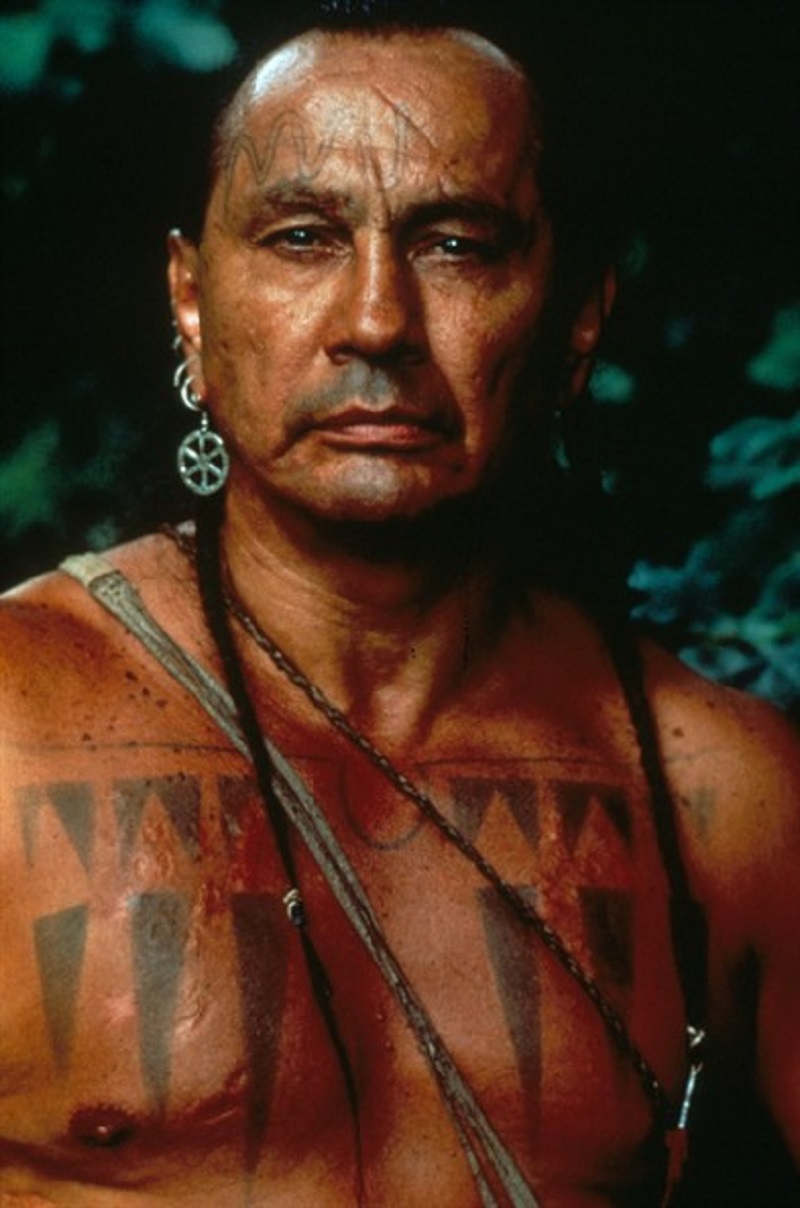 )
)
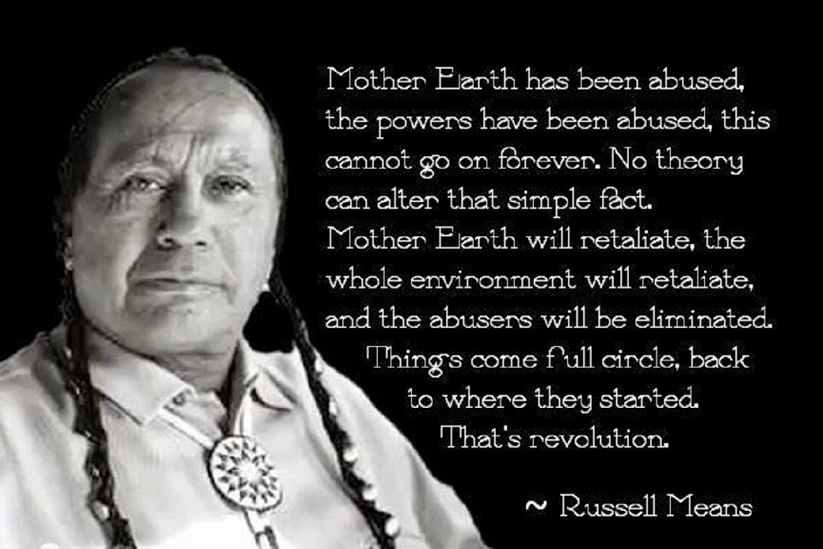 )
)
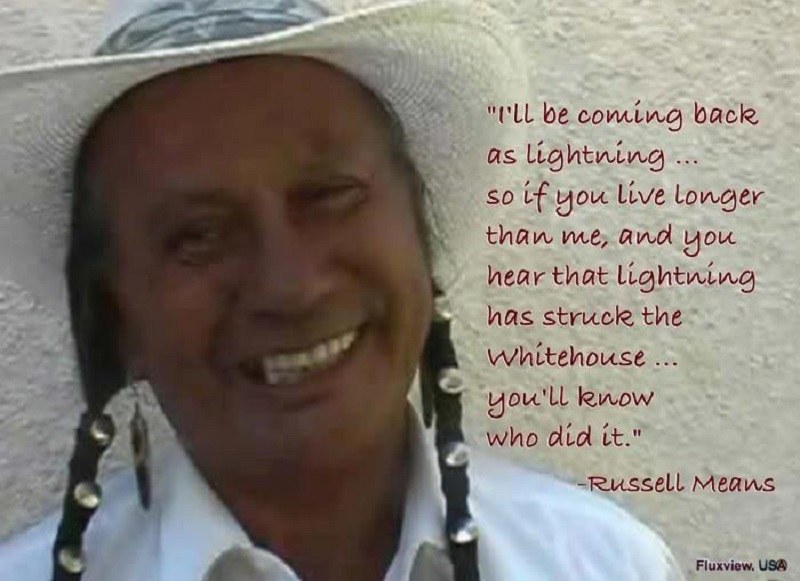
Russell Charles Means (November 10, 1939 – October 22, 2012) was an Oglala Sioux activist for the rights of Native American people and libertarian political activist. He became a prominent member of the American Indian Movement (AIM) after joining the organization in 1968, and helped organize notable events that attracted national and international media coverage.
2009 - Russell Means Comments on Obama's Nobel Peace Prize
)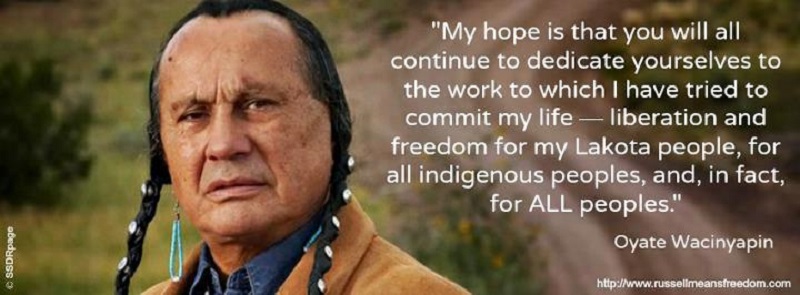
Means was active in international issues of indigenous peoples, including working with groups in Central and South America, and with the United Nations for recognition of their rights. He was active in politics at his native Pine Ridge Indian Reservation and at the state and national level.
Beginning an acting career in 1992, he appeared in numerous films, including The Last of the Mohicans and released his own music CD. He published his autobiography Where White Men Fear to Tread in 1995.
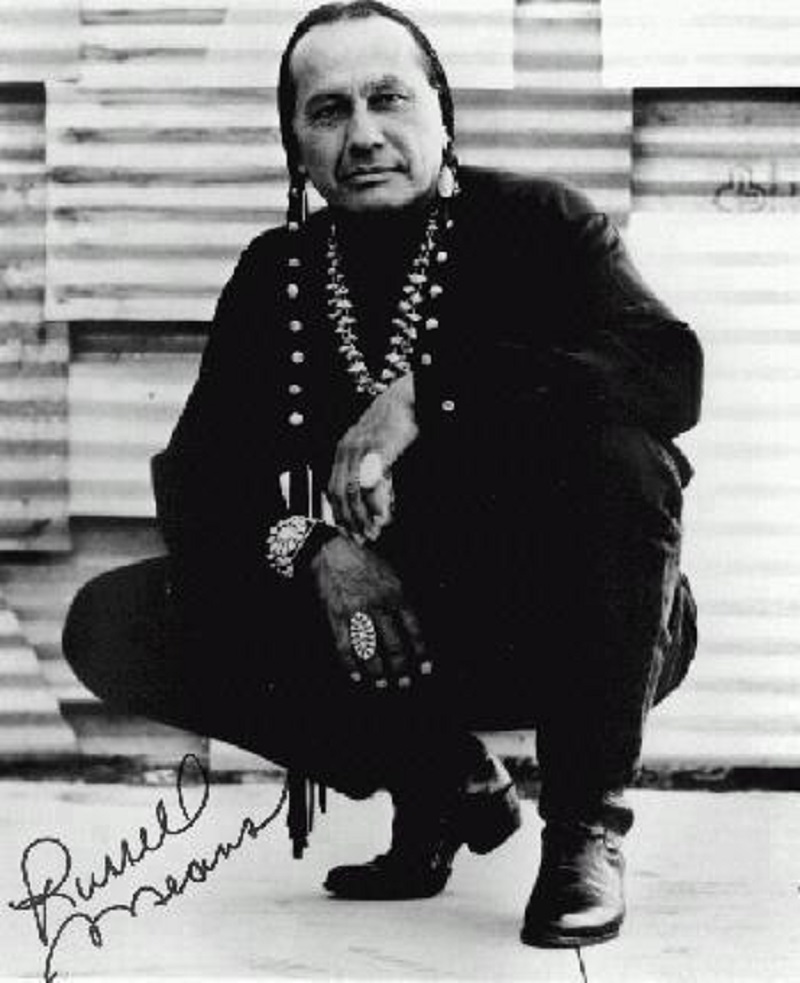
http://en.wikipedia.org/wiki/Russel_Means
Full name Russell Charles Means (aged 72) was an Oglala Sioux activist for the rights of Native American people and libertarian political activist. He became a prominent member of the American Indian Movement (AIM) after joining the organization in 1968, and helped organize notable events that attracted national and international media coverage.